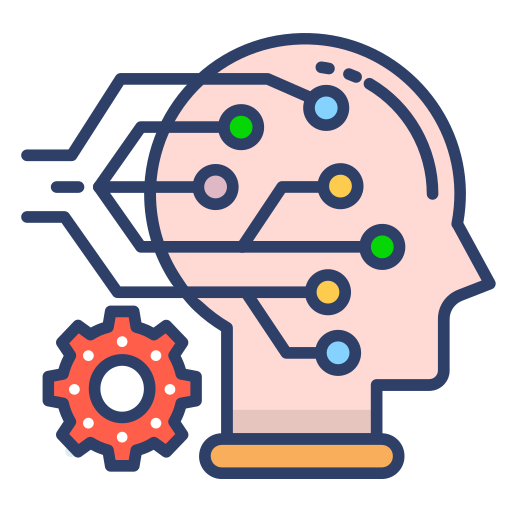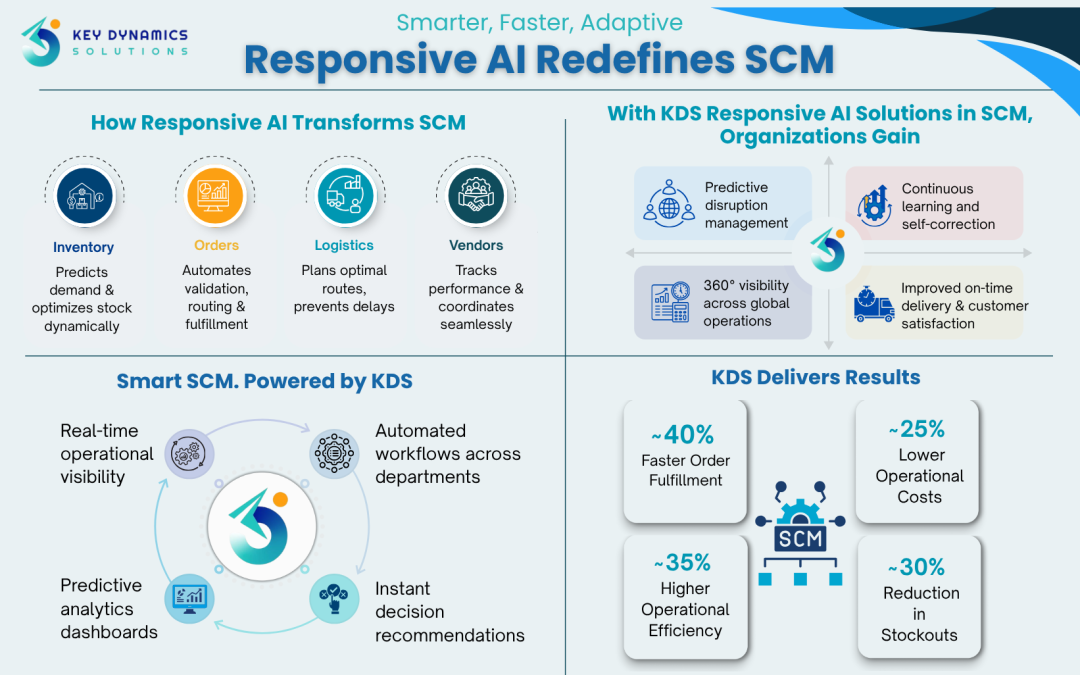In today’s fast-moving global economy, supply chains are under more pressure than ever. Companies face fluctuating customer demand, logistics disruptions, supplier instability, and the ever-present need to drive efficiency and agility. Traditional, static systems—built on manual decision-making or rigid automation rules—simply cannot keep pace. At Key Dynamics Solutions, we believe the shift is clear: supply chains must become responsive—able to sense change, decide rapidly and act autonomously. That is where Responsive AI enters the picture.
What Is Responsive AI?
Responsive AI is the next evolution of AI in the supply chain context. Unlike early AI systems that primarily focused on forecasting or rule-based automation, Responsive AI is designed to be adaptive, autonomous and continuously learning. It doesn’t just predict what will happen; it senses what is happening in real time (or near-real-time), determines what should happen, and initiates or recommends actions immediately.
Key traits of Responsive AI include:
- Real-time sensing of supply-chain signals (inventory levels, logistics status, supplier events, external disruptions)
- Context-aware decision-making (based on live data, system state and business priorities)
- Automated or semi-automated execution of corrective or optimizing actions
- Continuous learning loops that refine intelligence as the system operates
In short, Responsive AI transforms supply chains from reactive to proactive—and ultimately to self-optimizing.
Why SCM Needs Responsive AI
The rationale for deploying Responsive AI is compelling. Several recent studies and industry reports highlight the limitations of traditional SCM systems and the gains that intelligent systems can deliver.
For example, AI-driven supply-chain systems have shown improved forecasting accuracy, reduced costs, improved visibility and stronger resilience.
At Key Dynamics Solutions, we’re hearing the same story from the enterprises we support. The challenges are persistent: lack of visibility into supplier tiers, slow reaction to disruptions, excess inventory or stock-outs, and logistics routing inefficiencies. To overcome these, supply chains must become responsive. That means shifting from “what’s scheduled” to “what’s happening + what should we do now”.
How Responsive AI Transforms Functions
Let’s unpack how Responsive AI touches core SCM functions, and how KDS helps you operationalize them.
- Inventory & Demand Management
Responsive AI continuously monitors inventory across locations, considers demand signals, supply-chain constraints and external inputs (e.g., promotions, events, weather) and then recommends or automates stock adjustments. The result: fewer stock-outs, less overstock, improved working capital efficiency. By embedding Responsive AI, companies can move from “set safety stocks and reorder rules” to “dynamic safety stocks + automated replenishment decisions”.
- Order Management & Fulfilment
In traditional setups, orders may wait in queues, require manual checks, and only then get routed for fulfilment. With Responsive AI, order-flow is monitored in real time—availability, lead-times, inventory state, logistics capacity—and the system can reroute, prioritize or split orders autonomously, ensuring faster fulfilment and fewer delays.
Logistics is a domain ripe for responsiveness. Live data on traffic, weather, vehicle status, and shipment progress can feed into a Responsive AI engine that adjusts routes, reschedules carriers, reallocates loads and triggers alerts for delays. The net effect is improved on-time delivery, lower freight cost and fewer surprises.
- Supplier & Risk Management
Suppliers are the weakest links in many networks. Responsive AI continuously tracks supplier performance, lead-time deviations, financial or geopolitical risk signals and triggers mitigation—such as sourcing alternatives, adjusting orders or flagging issues earlier. This means fewer “unknown unknowns” and more resilient supply chains.
- Strategic Decision Intelligence
Beyond operations, Responsive AI powers decision-making: scenario modelling, “what-if” analysis, prescriptive actions and learning from outcomes. At KDS, we emphasise that the value lies not just in prediction, but in prescription and autonomous execution—the chain acts before you even raise the flag.
- The Business Impact
While exact figures differ by sector, research indicates significant gains for companies embracing AI in SCM: improved forecasting accuracy, cost reductions, inventory balance improvements and faster decisions.

By embedding Responsive AI, companies move from “monitoring” to “acting & learning”, and that shift is the difference between keeping up and leading.
KDS Approach & Integration with Microsoft Dynamics 365 SCM
At Key Dynamics Solutions, we integrate Responsive AI into your existing enterprise backbone—most notably into Microsoft Dynamics 365 Supply Chain Management (D365 SCM). Why this matters: D365 SCM is a robust, unified platform already trusted by many enterprises, and layering Responsive AI on top enables real-time data flow, decision automation and closed-loop learning.
The result is a supply-chain ecosystem that is not only digital but intelligent, truly responsive and aligned with business outcomes.
Industry Applications & Use Cases
Responsive AI is not theoretical—it’s already operational across industries:
- Manufacturing: Adaptive production planning based on real-time input, minimizing downtime and ensuring raw-material flow.
- Retail & eCommerce: Dynamic restocking, micro-fulfilment optimisation and rapid fulfilment decisions based on live sales and logistics state.
- Healthcare & Life-Sciences: Cold-chain monitoring, alerting to conditions and rerouting when environmental thresholds are breached.
- Logistics & Distribution: Fleet optimisation, dynamic routing and exception management in real-time.
At Key Dynamics Solutions, we tailor our Responsive AI solutions to the specific context, scale and complexity of each client’s supply-chain network.
The Road Ahead
The future of SCM is not simply “automated” but adaptive. Responsive AI will increasingly integrate with other emerging technologies—digital twins, generative AI, IoT, agentic ai —and enable supply chains that self-heal, self-optimise and even self-collaborate across enterprises.
For enterprises that adopt early, the advantage is clear: faster time to value, stronger resilience and differentiation in the marketplace.
Why Choose Key Dynamics Solutions?
With KDS, you gain a partner who brings:
- Deep expertise in Microsoft Dynamics 365 SCM implementations
- Proven Responsive AI frameworks tailored for supply-chain contexts
- End-to-end support—from strategy and pilot to scale and optimisation
- Focus on measurable business outcomes, not just technology
We believe that supply chains powered by Responsive AI become assets—not liabilities. They become strategic capabilities.
Conclusion
Responsive AI is not a futuristic concept—it’s the next frontier of supply-chain intelligence. For companies seeking agility, resilience and performance in a volatile world, it’s not enough to plan for tomorrow—you must respond in the moment. With KDS guiding your transformation and integrating Responsive AI into Dynamics 365 SCM, you can build an ecosystem that senses change, acts autonomously and learns continuously. Today’s supply-chain winners won’t be those that automate—they will be those that respond.
Connect with KDS today and unlock the full potential of Responsive AI in your supply-chain.
Read Also: AI Agents in Dynamics 365 Supply Chain Management

 Logistics
Logistics  Life Science
Life Science  Healthcare
Healthcare Services
Services Manufacturing
Manufacturing  Banking & Finance
Banking & Finance Retail
Retail E-Commerce
E-Commerce Finance
Finance Supply Chain Management
Supply Chain Management Sales
Sales Customer Service
Customer Service Field Service
Field Service Project Operation
Project Operation Marketing
Marketing Human Resources
Human Resources Business Central
Business Central Data Integration
Data Integration Data Warehousing
Data Warehousing Data Analytics
Data Analytics Data Visualization
Data Visualization Data Governance
Data Governance Big Data
Big Data Looker Studio
Looker Studio Power BI
Power BI Power Apps
Power Apps Power Automate
Power Automate Power Virtual Agents
Power Virtual Agents AI Builder
AI Builder Data Machine Learning
Data Machine Learning Prediction & Forecasting
Prediction & Forecasting BOTs & Virtual Agent
BOTs & Virtual Agent Language Services
Language Services Generative AI
Generative AI Agentic AI
Agentic AI iOS & Android Development
iOS & Android Development Cross-Platform Development
Cross-Platform Development UI/UX Design
UI/UX Design App Testing & QA
App Testing & QA Backend Development
Backend Development
